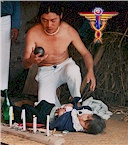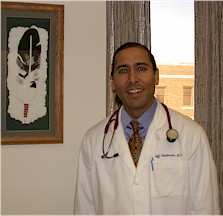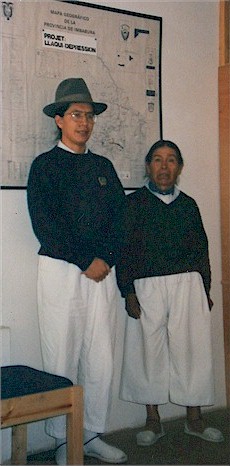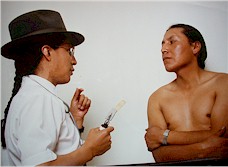Luce Faculty Seminar
2004

Healer-Physician
Collaborations in the Americas:
The Indigenous Peoples' Experience
|
APRIL
21, 2004
Opening
Mario Incayawar, M.D., M.Sc.
Henry R. Luce Professor in Brain, Mind & Medicine:
Cross-Cultural Perspectives
Pitzer, Claremont McKenna, Harvey Mudd Colleges.
Welcoming
Mark Acuña
Tongva Tribal Elder
Moderator
Sharon
Snowiss, Ph.D.
Professor of Political Studies
Pitzer College
Introducer
Cristina Leal
Claremont McKenna Senior Student
|
|
Could Healers and
Doctors Work Together to Heal
American Indian Historical Trauma?
Tom
Ball, Ph.D.

Director
Native American Research Center for Health
Native American
Spiritual Practice in a State Prison System
Tyler
Barlowe, M.S.
Spiritual Advisor
Klamath Tribal Health & Family Services Behavioral Health Clinic
Oregon Department of Corrections
Utilization of
Traditional Healers by American Indians
Jeffrey
Henderson, M.D., M.P.H.

President and CEO
Black Hills Center for American Indian Health
The Yachactaita
(Inca Healers) Contribution to
Mental Health in the Andes
Mario
Incayawar, M.D., M.Sc., D.E.S.S.

Director
Runajambi (Institute for the Study of Quichua Culture and Health)
Henry R. Luce Professor in Brain, Mind, & Medicine:
Cross-Cultural Perspectives
Pitzer, Claremont McKenna, and Harvey Mudd Colleges
|
This event is
open to registered Faculty and Students
Location
Founders' Room, McConnell Center, Pitzer College.
Time
11:00 AM to 1:00 PM
Lunch-discussion
Founders' Room, Pitzer College
|
Driving Directions and Maps
Founders
Room, McConnell Center, Directions
& Campus Map
Sponsored
by the Mind, Brain, and Medicine: Cross-Cultural Perspectives Program
Pitzer, Claremont, McKenna, and Harvey Mudd Colleges
Funded by the Henry R. Luce Foundation

|
|
|
|

|
Tom Ball, Ph.D.
Could Healers and
Doctors Work Together to Heal American Indian Historical Trauma?
Wednesday, April 21, 2004
Historical Trauma, has been described as
the distress and suffering resulting from numerous compounding
historically traumatic events experienced by a community over several
generations (Yellow Horse Brave Heart, 1996b). These historical
traumas have enduring consequences. Many First Nations people are
now using the term “soul wound” or “wounded spirit” to describe
the mental, physical and spiritual consequences the cumulative effect of
500 years of colonialism, genocide and oppression has had on our people.
Can Native Healers and Western Doctors work together to heal AIAN peoples
collective soul wound? This presentation will surface some of the
issues that this question raises.
Tom Ball, Modoc/Klamath is an enrolled
member of the Klamath Tribes. He received his B.S. in Education from
Oregon State University in 1977, and his Ph.D. in Special Education and
Rehabilitation from the University of Oregon in 1998. Dr. Ball has
taught school and served as Indian Education Coordinator for the Siletz
Tribes; worked for the Northwest Portland Area Indian Health Board in
various capacities for 10 years; the Klamath Tribes for 8 years as health
researcher and planner; and served two terms on the Klamath Executive
Committee and one as Tribal Chairman. Dr. Ball is an adjunct faculty
at Portland State University, teaching in the First American Education
Series. Dr. Ball is currently an associate researcher at the Oregon
Social Learning Center in Eugene, Oregon, serving as Co-Investigator on
the Indian Family Wellness Project, Conference Coordinator for the annual
Healing Our Wounded Spirits Conference, Principal Investigator on the
Intergenerational Grief and Unresolved Trauma project, and Director of the
Native American Research Center for Health. Research interests
include studying the effects of post colonial stress and historical trauma
in Indian communities, and developing research capabilities at the
tribal/community level.
References:
 |
Eduardo Duran and Bonnie Duran. Native
American Postcolonial Psychology, SUNY Press, 1995. |

|
|

|
Tyler Barlowe, M.S.
Native American
Spiritual Practice in a State Prison System
Wednesday, April 21, 2004
In 2003, almost 1000 different Oregon
State prison inmates exercised their constitutional right to express and
practice their faith by attending Native American ceremonies. Tyler has
been actively involved in opening doors to help this movement grow as well
as providing traditional ceremonies inside prisons. Tyler will share his
experiences with this process as well his research into spiritual
development. He will present his current work on historical trauma within
the Klamath community in partnership with the Klamath Tribes Behavioral
Health Clinic. Based on work by Eduardo Duran and Tom Ball, Tyler is
developing a holistic model, a vision for offenders to reduce recidivism
as well as regain family and community trust. Tyler will address his
belief in the need for future research, describing his work in progress
with the Behavioral Health Clinic.
Tyler Barlowe is a Native American of Modoc
descent and an enrolled tribal member of the Klamath Tribes. The
Klamath Tribes have acknowledged Tyler as a spiritual advisor and support
his work with incarcerated Native peoples. For approximately the past
twelve years Tyler has been a volunteer with the Oregon Department of
Corrections (ODOC) Religious Service section. As a volunteer, his primary duties
were to facilitate Native American ceremonies. He has built and blessed
sacred sweat lodges in Oregon prisons and regularly leads
sweat lodge ceremonies, talking circles, and pipe ceremonies for both male
and female prisoners. In 2003, the ODOC hired Tyler as a Chaplain to
work alongside a team of 20 Chaplains in the prison system. He also works
as a member of the Klamath Tribes Behavioral Health Clinic integrating
traditional and western healing. Through the clinic, Tyler is working on a
prison reentry model for Klamath Tribal members returning to the Klamath
community.
Tyler obtained a Bachelor of Science Degree in Applied Psychology
from the Oregon Institute of Technology and a Master of Science Degree in
Psychology from the University of Oregon. He is a past delegate from
the International Indian Treaty Council to various United Nations
functions in, Holland, Switzerland, and Nicaragua.

|
|

|
Jeffrey
Henderson, M.D., M.P.H.
Utilization of
Traditional Healers
by American Indians
Wednesday, April 21, 2004
Dr. Jeffrey Henderson will present his
research on factors influencing traditional healer utilization among
American Indians and Alaska Natives. He will present a cross-sectional
analysis of data collected in 1987 from over 2,000 American Indian and
Alaska Native households, including descriptive analyses examining the use
of traditional healers according to demographic, clinical, and cultural
factors. English as a second language, a proxy for a complex set of
cultural factors, was strongly associated with traditional healer use, and
advanced education, cultural participation, comorbidity, and disability
bed-days predicted traditional healer use.
Dr. Henderson is a Lakota and enrolled
member of the Cheyenne River Sioux Tribe. He obtained his Bachelor's
(1985) and Medical (1989) degrees from UC San Diego. He completed a 3-year
residency in Internal Medicine at the University of Washington (UW) in
Seattle, before he moved to Eagle Butte, South Dakota in 1992, where he
became the Clinical Director of the Indian Health Service hospital for two
years. He returned to UW in 1994, where he completed his Master's in
Public Health. Dr. Henderson then moved to Black Hills, SD and worked for
two more years at the Sioux San IHS hospital before joining the Strong
Heart Study in 1998. In 1998 Dr. Henderson founded the Black Hills Center
for American Indian Health, a community-based, non-profit organization
whose mission is to enhance the wellness of American Indians living on the
Northern Plains through research, service, education, and philanthropy.
The Center has met stunning success, garnering over $7.5 million through
five NIH health research grants. When not working, Dr. Henderson can be
found spending time with his beautiful wife, 2 1/2-year old daughter and
6-month old son, dancing and singing at pow-wows, riding his bicycle,
golfing, and hiking throughout the Black Hills.
References:
1. Buchwald D, Beals J, Manson SM. Use of
traditional health practices among Native Americans in a primary care
setting. Med Care. 2000;38(12):1191-1199. For a copy click HERE
2. Kim C, Kwok YS. Navajo use of native
healers. Arch Intern Med. 1998;158(20):2245-2249. For a copy click HERE

|
|


|
Mario Incayawar,
M.D., M.Sc., D.E.S.S.
The Yachactaita
(Inca Healers) Contribution to Mental Health in the Andes
Wednesday, April 21, 2004
Indigenous Peoples are poor,
dispossessed, and powerless throughout the Americas. Mental disorders and
psychological suffering are widespread but receive little or no attention
by their respective governments. The scarcity of mental health programs
serving the Indigenous Peoples is alarming in Latin America. This
presentation describes an innovative mental health service program
developed by the Quichuas of Otavalo, Ecuador. The Quichua proposal
promotes the collaboration of healers and doctors as a key element for
building culturally appropriate services for Amerindian communities. This
experience could be a good mental health care strategy for Amerindians
living in poor countries in the Americas, where mental health services and
resources are almost nonexistent.
Professor Mario Incayawar is a Quichua
(Inca) physician, educator, and researcher interested in the health and
traditional medicine of the Indigenous Peoples of the Americas. He is the
first Quichua physician to graduate from an Ecuadorian medical
school. His areas of expertise include transcultural psychiatry,
Indigenous medical systems, culturally adapted medical systems, Indigenous
knowledge, pain & ethnicity, and the neuroscience of the healing
process.
He is currently the Henry R. Luce Professor
in Brain, Mind, and Medicine: Cross-Cultural Perspectives at Pitzer,
Claremont McKenna and Harvey Mudd Colleges in Claremont, California, and
Director of Runajambi (Institute for the Study of Quichua Culture and
Health) in Otavalo, Ecuador. He has authored 50 papers in medical
education and delivered scholarly presentations in Canada, USA, Ecuador,
Europe, and Japan. For five years, he was a scientific consultant
and in charge of the Transcultural Medicine Section of L'Omnipraticien
medical magazine. Recently he has completed
studies on Llaqui (depression-anxiety), and pain experiences among
the Quichua in the Andes. He is currently engaged in a research
project entitled “Screening Clinically Promising Healing Practices Among
Native Americans of California,” a study supported by a Faculty
Fellowship from the John Randolph Haynes and Dora Haynes Foundation.
References:
 | Mario Incayawar. The Yachactaita's
(Quichua Healer) Contribution to Mental Health in the Andes: An Amerindian
Initiative. |

|
 
|
